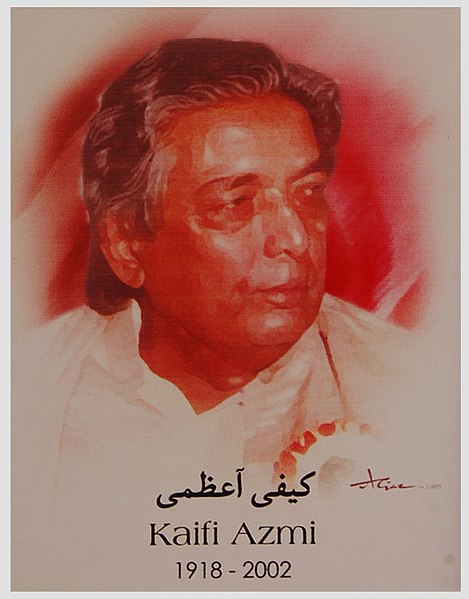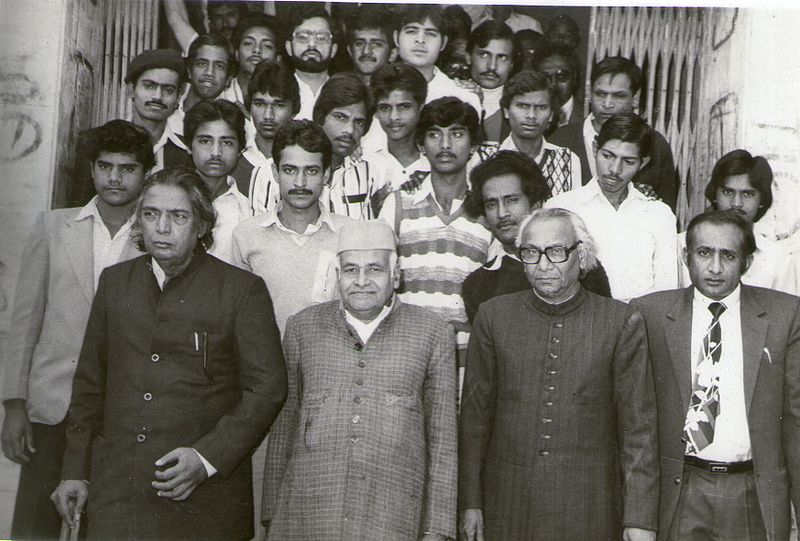Kaifi Azmi’s “The Circle” Posted by Rachael on Feb 20, 2018 in Uncategorized
Kaifi Azmi (کیفی اعظمی, or Sayyid Akhtar Hussein Rizvi, as he was born) is one of Urdu’s greatest poets (شاعر/shaayar) and remains legendary to this day as a poet capable of expressing the subtlest of sentiments with uncanny astuteness and daring. You may recognize his name from that of Shabana Azmi, a famous Indian actress who is also his daughter. Born in 1919 in a village in Azamgarh district, Uttar Pradesh (in what was then British India), Azmi began writing at an early age and achieved fame for his writings not long afterward. In addition to his more literary (ادبیات/adabyaat, “literature” is ادب/adab, masc. noun) work, he is well-known as a lyricist for popular Hindi-Urdu films. Due to his penchant for blending his literary background with the work he did for films, he is remembered today for bringing a refinement and subtlety to Indian films through his literary touch. Along with other famous poets of his day, he took part in numerous renowned “mushairas” (مشاعرا, masc. noun) or poetry gatherings, during his life. He passed away in 2002, leaving behind his poetic legacy for future readers to admire.
Below, I’ve translated one of his classic poems with notes at the bottom where necessary:
Kaifi Azmi’s “Daera” (“The Circle”)/”کیفی اعظمی کی “دائره
published in Awaara Sajde (Wayward Prayers) (1995)
A central aim while translating this poem was to depict the “circularity” and drudging mundanity of the poem that strikes one ever more viciously as one continues to read. Although I attempted to be as faithful as possible to the original wording and sense of the poem, occasionally I had to add English words and phrases to the original, as in “day after day I moved forward” instead of the simpler sense of “roz” as “daily, every day.” I wanted the poem to have an arduous, plodding sense about it, weighed down by life’s dullness and cyclical nature, which I tried to achieve with such turns of phrase (others include “many a time,” “time and again,” “corner after corner,” “habitually” and the repetition of “too” to mirror the writer’s repeated use of the word “bhi” in the original).
|
English Translation |
Urdu Text |
|
Day after day I move forward |
روز بڑھتا ہوں جہاں سے آگے |
|
Only to return to the same place (world)* |
پھر وہیں لوٹ کے آ جاتا ہوں |
|
Many a time, I’ve destroyed them |
بارہا توڑ چکا ہوں جن کو |
|
The walls I collide with, time and again |
انہیں دیواروں سے ٹکراتا ہوں |
|
Day after day, a handful of cities spring up |
روز بستے ہیں کئی شہرنئے |
|
Day after day, they sink further into the earth |
روز دھرتی میں سما جاتے ہیں |
|
During the earthquakes, the slightest heat could be felt |
زلزلوں میں تھی ذرا سی گرمی |
|
Those tremblings occur every day now |
وہ بھی اب روز ہی آ جاتے ہیں |
|
⚜ |
⚜ |
|
From the body to the soul, everything is dust, only dust |
جسم سے روح تلک ریت ہی ریت |
|
Nowhere is there sunshine, nor shade, nor self-deception* |
نہ کہیں دھوپ نہ سایہ نہ سراب |
|
How many desires lie hidden in the wilds |
کتنے ارمان ہیں کس صحرا میں |
|
Who keeps an account of tombs |
کون رکھتا ہے مزاروں کا حساب |
|
The pulse is extinguished and ignited, too, |
نبض بجھتی بھی بھڑکتی بھی ہے |
|
The heart’s custom is unease, too, |
دل کا معمول ہے گھبرانا بھی |
|
At night, the darkness spoke to the darkness: |
رات اندھیرے نے اندھیرے سے کہا |
|
To keep living is a habit, too. |
یک عادت ہے جیے جانا بھی |
|
⚜ |
⚜ |
|
The arc of the stars is of one kind |
قوس اک رنگ کی ہوتی ہے طلوع |
|
The goblet, too, has only one trick |
یک ہی چال بھی پیمانے کی |
|
On corner after corner, a mosque stands |
گوشے گوشے میں کھڑی ہے مسجد |
|
Then what has become of the tavern’s guise? |
شکل کیا ہو گیٴ مےِخانے کی |
|
Someone used to say, “I am the ocean,” |
کویٴ کہتا تھا سمندر ہوں میں |
|
But, in my pocket, there isn’t even a drop. |
اور میری جیں میں قطرہ بھی نہیں |
|
I write of my good fortune, habitually |
خیریت اپنی لکھا کرتا ہوں |
|
Now, there isn’t the slightest risk in my fate |
اب تو تقدیر میں خطرہ بھی نہیں |
|
I read my palms, habitually |
اپنے ہاتھوں کو پڑھا کرتا ہوں |
|
Sometimes like the Qur’an, sometimes like the Gita* |
کبھی قرآں کبھی گیتا کی طرح |
|
In just a few lines and borders |
چند ریکھاوٴں میں سیماوٴں میں |
|
Life is imprisoned, like Sita* |
زندگی قید ہے سیتا کی طرح |
|
When Ram will return, there is no word |
رام کب لوٹیںگے معلوم نہیں |
|
If only some Ravan would come |
کاش راون ہی کوئی آ جاتا |
*جہاں/jahaan can mean both “place” and “world,” and it is good to consider both senses of this term while reading the poem
*سراب/saraab technically means “mirage,” but I substituted it for “self-deception” to preserve the alliteration and rhythm of the line
*قرآن/Quraan, of course, refers to the Islamic holy book and گیتا/Gita refers to the “Bhagavad Gita,” a religious and philosophical text found in the Hindu epic poem Mahabharata that contains a dialogue between the god Krishna (an avatar of Lord Vishnu) and the prince and warrior Arjuna
*سیتا/Sita is the heroine of the Hindu epic poem Ramayana who is the wife of the tale’s hero, Rama. She is sought after due to her beauty by the evil King Ravana, who uses deception to abduct and imprison her on his isle of Lanka. The rest of the poem is devoted to Rama’s journey and struggles to find and free her. The “lines and borders” Azmi refers to can also be an allusion to the “Lakshman Rekha” or the magical line that Lakshman, Rama’s brother, draws around Sita at the beginning of the tale to protect her from abduction, a strategy which ultimately fails.

Build vocabulary, practice pronunciation, and more with Transparent Language Online. Available anytime, anywhere, on any device.





